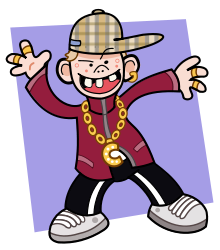chav
Hello, you have come here looking for the meaning of the word chav. In DICTIOUS you will not only get to know all the dictionary meanings for the word chav, but we will also tell you about its etymology, its characteristics and you will know how to say chav in singular and plural. Everything you need to know about the word chav you have here. The definition of the word chav will help you to be more precise and correct when speaking or writing your texts. Knowing the definition ofchav, as well as those of other words, enriches your vocabulary and provides you with more and better linguistic resources.

A caricature of a chav.
See also: čhâv
English

Etymology
Origin uncertain; probably of Angloromani origin. Compare Romani chavi (“male child”) or ćhavo, shavo (“female child”), chal (“boy”), chavvy (“mate, friend”), compare Swedish tjej; possibly cognate with Portuguese chavalo, Spanish chaval, German Chabo, Russian чувак (čuvak), Hungarian csávó. See also charva.
A derivation from "council-housed and violent" is widely regarded as a backronym and folk etymology.
Pronunciation
- (Received Pronunciation, General American) IPA(key): /t͡ʃæv/
Audio (UK): (file) - Rhymes: -æv
Noun
chav (plural chavs)
- (UK, MLE, Ireland, derogatory, offensive) A working-class youth, especially one associated with aggression, poor education, and a perceived "common" taste in clothing and lifestyle.
- Synonyms: charva, ned, pikey; see also Thesaurus:chav
- Coordinate terms: chavette; spiv, geezer, wide boy, dobber
- a. 2009, Dizzee Rascal (lyrics and music), “Creeper (Freestyle)”:
- Lyrical staff / Never could they ever take me for a chav / Scholar in the English, scholar in the Math / Dizzee ain't no riff raff
- 2011 June 18, “Giving the poor a good kicking”, in The Economist:
- His book concerns ‘chavs’, a supposed underclass of ill-educated, fast-breeding, violent and amoral poor people currently plaguing Britain.
Derived terms
Translations
relating to a youth from a working class background, aggressive with poor education
|
See also
References
- "Good news for chavs: they may be cool people soon" by Robin Young, The Times, 2004-10-19, accessed 2005-04-15
- World Wide Words: chav, by Michael Quinion, accessed 2005-04-15
- Posting by "Quizmonster" in The Answer Bank, 2005-02-22, accessed 2005-04-15
- Posting by "Dick Jones" in FrizzyLogic, 2004-03-19, accessed 2005-04-15
- "The Chavs are Coming", The Irish Times 2005-03-23, accessed 2005-04-15
- Bragg, M. 'The Adventure of English', London, Hodder and Stoughton, 2003: 26.